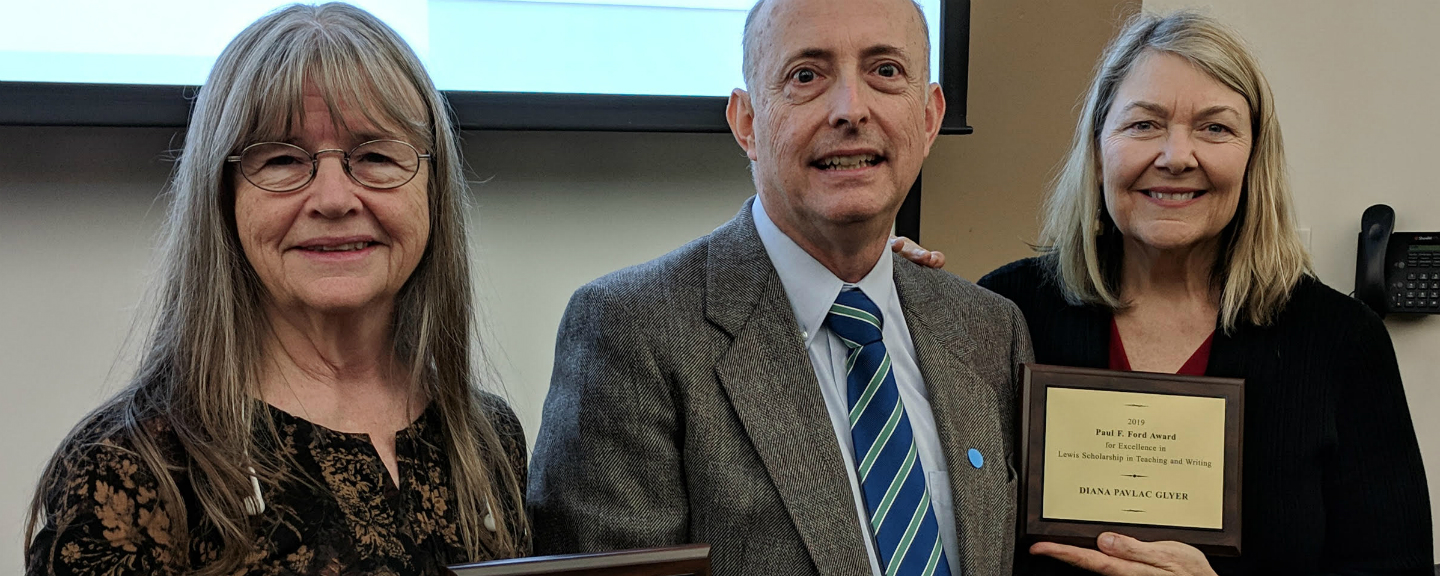Diana Pavlac Glyer Receives Paul F. Ford Award for Excellence in C.S. Lewis Scholarship
Cheers break out across the room as Azusa Pacific University professor and award-winning author Diana Glyer, Ph.D., ascends the stage to receive the Paul F. Ford Award for Excellence in C.S. Lewis Scholarship. The Southern California C.S. Lewis Society (SCCSLS) created this award in honor of their founder, choosing Glyer as the first recipient at their annual conference. Astonished beyond words, Glyer expressed immense thankfulness for the recognition of her lifework.
In celebration of this award, Glyer shares some thoughts on the author and his impact on her life, providing a glimpse into the imaginative and wisdom-filled world of C.S. Lewis that has captured her attention for so many years.
Why is C.S. Lewis still such a renowned author and apologist today? What sets him apart from others?
Some authors are able to write with brilliant insight, others with lively imagination. I think what sets Lewis apart is his ability to do both. He had such a fine mind, so his work is deep in insight. He had such a rich imagination, so his work is filled with wonder. In his fiction, poetry, and nonfiction work, you see what is possible when you cultivate both reason and imagination.
When was the first time you encountered the work of C.S. Lewis?
I first read Lewis when I was in high school. All my friends were enchanted with Tolkien at the time. So I read The Lord of the Rings, and when I finished it, I went looking around for other books, hoping to find something similar. I found Lewis’ Out of the Silent Planet. It’s science fiction, not fantasy, but it shares a similar depiction of goodness as deeply desirable, admirable, and inspiring. Not only that there was something about the way that Lewis captures the essence of friendship with God that resonated with me. I’ve been reading Lewis ever since.
Why did you decide to focus so much of your career on this particular author?
I love reading Tolkien and Lewis. When I discovered that these two creative writers were close friends, I was intrigued. I wanted to know the answer to two questions: What did these two authors say to each other? And What difference did it make to the books they were writing? As it turns out, there is a lot to know about those seemingly simple questions. I’ve written two books about it, and I’m working on a third. It’s a fascinating study, and I never get tired of it.
How has C.S. Lewis impacted you as an individual?
Lewis has inspired me through his books, but also through his example as a faithful Christian. One of his friends described him as “the most thoroughly converted man I ever met.” What does it look like to be completely devoted to Christ, to be thoroughly converted in heart and mind? Striving to live out the answers to that question is probably his biggest influence on my life.
What is your favorite C.S. Lewis passages, and why?
That’s always a treacherous question! One of the qualities I find in Lewis is that my favorite book always seems to be the one I’m currently reading. But I can tell you that there is one scene from Lewis’s writings that always makes me cry. It’s from A Horse and His Boy. In it, the main character, a boy named Shasta, is weary, discouraged, and afraid. He meets the great lion Aslan on the road. In anger and frustration, Shasta pours out his heart to the Lion, complaining about all of the horrid things that have happened to him. But to Shasta’s amazement, Aslan explains that what seemed to be detours and setbacks were not accidents. Aslan himself was active and present in each step of his life: “I was the lion who forced you to join with Aravis. I was the cat who comforted you among the houses of the dead. I was the lion who drove the jackals from you as you slept. I was the lion who gave the Horses the new strength of fear for the last mile so that you should reach King Lune in time. And I was the lion you do not remember who pushed the boat in which you lay, a child near death, so that it came to shore where a man sat, wakeful at midnight, to receive you.” I am amazed as I meditate on this truth: God is with us in every situation. God is at work in all events. God makes provision for us, even when we are too young, too frightened, or too distracted to understand.
How would you encourage others to read C.S. Lewis’ works? What book would you recommend starting with?
Part of the reason that Lewis is so popular is that he wrote so many different kinds of books. I recommend that people start with whatever genre they most prefer. Do you like science fiction? Read Out of the Silent Planet. Prefer classic apologetics? Start with The Problem of Pain or Mere Christianity. Fascinated with linguistics? Try Studies in Words. Medieval history? The Discarded Image. Fiction? Till We Have Faces. Sermons? Don’t miss The Weight of Glory and Other Essays. Bible study? Read Reflections on the Psalms.
Having said that, there are two books by Lewis that I believe are too often neglected. And they are two of my favorites. One is An Experiment in Criticism. It’s a great book about how to read, and why stories matter. The other is Letters to Malcolm, Chiefly on Prayer. It is the perfect devotional: short chapters, easy reading, substantial content, real spiritual food. As a bonus, it is one of the best sources we have about Lewis’s own devotional practice, and that alone is inspiring.
Posted: April 17, 2019
